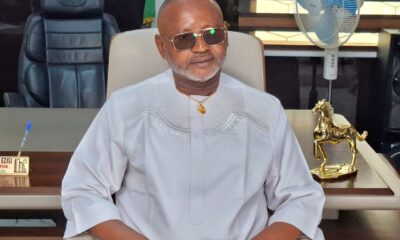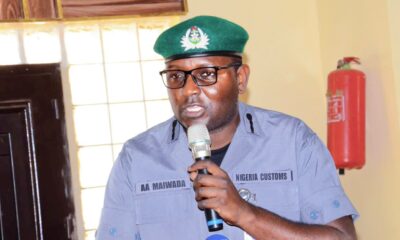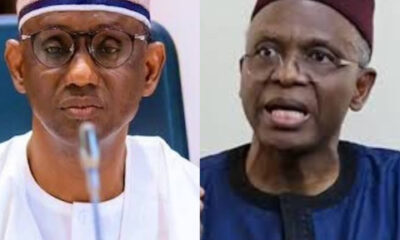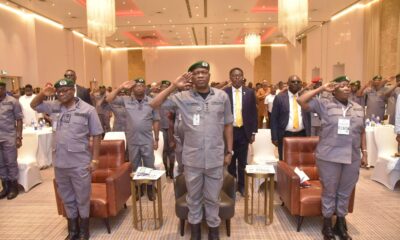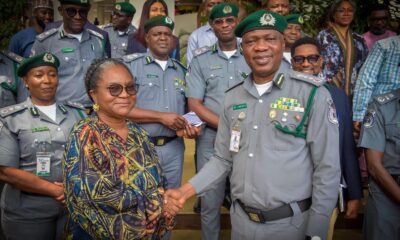Interview
‘Why We Launched B-Odogwu Pilot Scheme With Webb Fontaine Still Running’ – Adeniyi

The Comptroller General of Nigeria Customs Service, Bashir Adewale Adeniyi has explained reasons management launched the pilot operation of the new system application for documentation and release of cargo, with Webb Fontaine, the ICT specialist firm that designed NICIS 11, already penciled down for elimination following the successful take off of Odogwu.
Speaking with journalists after addressing his officers and men on the formal launching of B-Odogwu at the Ports Multipurpose Terminal Limited (PTML) yesterday, October 23, 2024, Adeniyi explained reasons Webb Fontaine overstayed its contract duration that lapsed between 2021 and 2022, giving the time frame for the firm and its patented NICIS 11 to shut down and exit the customs port.
Giving a broad overview of B-Odogwu, the CGC took stakeholders and Nigerians on a tour of the new customized indigenous system, as the first in the subregion if not the continent, to get introduced into world customs organization. Eguono Odjegba was there and report. Excerpt:
Could you speak on your visit to the PTML Command?
In the last one hour l have been having engagement with our stakeholders, the terminal operators on a major landmark development. It is for on the spot assessment of the roll-out of ‘B Odogwu’ and that is our new unified customs management system. It is indeed an important achievement and a significant milestone in our journey towards modernizing Nigeria customs operations and aligning those operations with global best practice. The exercise that we are undergoing is firmly rooted in the policy force of the customs management upon my assumption of office, and this emphasizes the need to consolidate on the previous gains while boldly embracing innovative solutions to long standing challenges.
This policy is also aligned with the strategic objectives of President Bola Ahmed Tinubu led administration to make customs more effective and efficient for the benefit of Nigerians. The support for the actualization of this has been midwife by the Honorable Minister of Finance and Coordinating Minister of the Economy and the Chairman of the Nigeria Customs Board in the implementation of several initiatives, including the roll-out of the pilot scheme of B-Odogwu that epitomizes our drive to adapt and adopt cutting edge technology to enhance our processes and our procedures.
B-Odogwu Structure
It is worth noting that this initiative is fully supported by the legal framework provided with the Nigeria Custom Service Act 2023 and specifically in Section 28 and 29 of the Act which empowers us to develop, maintain and employ electronic systems, while ensuring transparency and stakeholders’ consultations. B Odogwu will serve as the cornerstone platform supporting this technological evolution mandated by the law. Our choice of this terminal for this pilot implementation is deliberate and strategic. This is not a random selection or an experimental trial. Rather, it is a calculated decision based on the terminal’s proven track record as a key vehicle transshipment hub connecting Europe and Africa. PTML has consistently demonstrated operational excellence and maintained robust infrastructure that supports seamless customs operation.
“It is disappointing when organizations failed to leverage their extended presence in Nigeria to build credible reputations that could benefit them, both locally and internationally. And I’m being very, very careful in the selection of my words that the end of our contractual obligations of Webb Fontaine with Nigerian Customs Service has not been as expected. We are not happy with the way it has gone, but we don’t have a choice, we have decided to move on with our life”
Choice of PTML
There are other factors that support our roll out and influenced the decision of this terminal. The first is the exemplary history of smooth interactions between customs and stakeholders in this terminal. The second one speaks to the availability of modern infrastructure provided by the terminal operator. Thirdly the substantial volume of transactions processed through this facility and finally; PTML’s successful track record as a model port for previous ground breaking NCS initiatives. I want to address an important point up front. Yes, we do anticipate some technical challenges during this roll out phase. This is normal with any new system implementation, and it should not cause us any alarm. We have positioned a dedicated team of technical experts to provide immediate support and ensure a smooth transition as much as possible. This team will be available round the clock to address any issue that may arise.
Future of Webb Fontaine following the development of B-Odogwu
Let me also be clear about the development of Odogwu. This platform is a product of direct collaboration between Nigeria Custom Service and the Trade Modernization Projects team (TMP). And I’m happy that I have with me the chairman of TMP, Alhaji Sale Ahmadu, who is also here with his team. This approach was necessitated by our experiences with previous service providers who, despite multiple contract extensions, failed to meet their deliverables and effect the expected handover at the end of their contract period, while we would have preferred a different outcome to those contracts, this situation has strengthened our resolve to develop indigenous solutions that truly serve our needs. It is disappointing when organizations failed to leverage their extended presence in Nigeria to build credible reputations that could benefit them, both locally and internationally. And I’m being very, very careful in the selection of my words that the end of our contractual obligations of Webb Fontaine with Nigerian Customs Service has not been as expected.
We are not happy with the way it has gone, but we don’t have a choice, we have decided to move on with our life. We’ve taken the bold decision to launch this new initiative and take on the processing of customs declaration through the new system that has been developed. While we look ahead, B Odogwu is our new customs management system that embodies our vision for a paperless Customs Administration, which facilitates seamless trade while maintaining robust security measures. The system will enhance our ability to streamline end-to-end business processes, to provide stakeholders with customized integration capabilities to support efficient and intelligent business decisions and to facilitate the ease of doing business. I am pleased to inform you that B Odogwu is one of the main deliverables of the Nigerian Custom Service modernization project.
Sensitization and Concerns
Since the commencement of pilot activities, we have made significant strides in preparing for this roll-out. Different users of the systems have been trained to be familiar with a more simplified interface and the new tools at their disposal. This terminal has received upgraded network infrastructure to meet modern demands, as we will see more complexities in declarations and address the peculiarities in our trade system, I can confidently say that the era of network downtime would be behind us.
Furthermore, we have successfully tested and we are now ready to deploy integration APIs with our key partners in the trade supply chains, including our banks, shipping lines, bonded warehouses and partner government agencies. Our stakeholders’ interactions to sensitize traders and agents on board have yielded overwhelming positive feedback. We will continue to engage and listen to their concerns, and I assure you that Odogwu is here to stay, and we will address those concerns effectively. Today, therefore marks a significant milestone as we commence users’ creation on Odogwu, which will give users access to their work environment within a unified platform.
B-Odogwu and NICIS 11

The service is also launching a verification platform for agents, which automates agents’ registrations for license and permits. It is important for us to know that Odogwu will eventually replace the current Nigerian integrated customs information system, NICIS 11, as the NCS legacy system. The system has been developed with foresights acknowledging that the national single window will be coming onboard soon, and Odogwu will be integrated with it when implemented by the federal government of Nigeria. The system is designed to complement ongoing attempts to leverage artificial intelligence, machine learning, virtual reality and mixed reality technologies In customs operations. This aligns with our commitment to maintaining strong, resilient, open and prosperous borders that epitomize the legal, policy and strategic commitments of the Nigerian Custom Service to all our stakeholders that are present today.
I want to emphasize that customs under President Tinubu’s administration is fully committed to serving the best interest of Nigerians. We understand our critical role in trade facilitation, revenue generation and national security, and we are determined to deliver on this mandate effectively and efficiently. I like to express our sincere gratitude to the terminal operators for their continuous support and provision of world class infrastructure. I also want to thank our dedicated custom officers, the members of the technical teams who have worked tirelessly to ensure the deployment that we are witnessing today.
I must also thank the license customs agents for their cooperation and patience during this transition period, all other stakeholders who have contributed to making this pilot possible, we also express our gratitude to them. And as we commence this pilot, I urge all our stakeholders to embrace this change with optimism, and we challenge them to provide a constructive feedback that would help us redefine and improve system as their input is crucial to the success of this initiative. And as I conclude, I want to reiterate that Odogwu represents Nigeria’s gifts to the customs global community as it showcases our capacity to develop homegrown solutions that meet international standards as well as address our unique needs. I want to thank you all for your attention, and I look forward to working together with all of you to ensure seamless implementing of these pilots, the venture rollouts of the system.
Cargo declaration time frame under B-Odogwu
In terms of time, what happened under PAAR will still happen. l want to imagine that if documentation is fine, if there are no issues with documents that are submitted, what Odogwu promises us is even better infrastructure, so we are going to have a better, swifter processes of documents. I don’t want you to hold me down to time now, what we are doing is that we are running a pilot and as we run this pilot, we will take our lessons, we will make mistakes, we will correct them, we will see gaps, we will cover them, so that by the time we announce that we have finished pilot and we are willing to roll out, then you can hold us accountable when say it takes us two hours, three hours to process PAAR, to process any declaration.
But we know the records that we are meeting in PTML, in my submission l told you that PTML is a model port. In our discussions with the terminal operator, they told us the apprehension and concerns of their stakeholders, so if they were getting their documentations and declarations done within 24 hours and we are bringing a system that will extend that time, they will know that we are not giving them something better than what they had before. So we are also very, very cautious of that and we want to be sure that as our technical team is rolling out Odogwu, we bear those concerns in mind.
Legal provisions to safeguard stakeholder’s interests
It is a pilot and that is why we are taking here first. All our experiences, all our lessons, we are going to learn them to enable us perfect the system and we now roll out officially in other commands. We have an agreement document that is as much as 200 pages, this document spells out the obligation of every party to the agreement. I was talking about some of them when we had our meetings with the stakeholders. So the obligation of TMP is clearly stated out, the obligation of Nigeria Customs Service is clearly stated out. But because we have a Nigerian company running a Nigerian project, what they have put in place is that they want customs to take ownership of this project.
They want customs to be at the front, they want customs to be the flag bearer. As l am talking to you now about this particular project, and l have called the customs officer who have been involved in the development right from the inception to speak, so l want to assure you that we all have very big stakes in this project. After sometime, l will remove my uniform, l will no longer be comptroller general definitely one day, and l want to look back at this type of project and smile in admiration that what we have left behind is good legacy for the next generation of customs officers.
Why the name Odogwu and what is its advantages over NICIS 11?
The first question talks about Odogwu, l am very sure that as Nigerians we are all familiar with the sobriquet, and l am sure we all know it stands for strength, it stands for somebody with power, somebody who can take charge of situations. And when you hear members of those generation calls somebody Odogwu, it means that that person is capable of taking care of the needs of the one calling him. Odogwu is what we assume, number one, it is indigenous to Nigeria, l am not sure that you will hear Odogwu in Ghana, or hear it in Cameroun, so it is essentially 100 percent Nigerian. So it’s an indigenous product but we have customized it, putting the word B before it, which stands for border. So it is a unified system helping us to manage our border which should be understood to be point of entry. We are putting the essential feature of bringing efficiency, effectiveness, strength, discipline into management of our border.
So we now have an Odogwu in charge of our border, it will provide us with everything that we need. For me, this is better than what we have always had because what we have always had had been imposed on us, by those who created those applications. Odogwu is a product of partnership between NCS and TMP, which is also a Nigerian company.
So, if you recollect, all the companies that we have worked with before were non Nigerian. Sometimes, they bring one person to be in front, so that you will be seeing a Nigerian face and behind them there are people actually calling the shots in Switzerland, in London or wherever, now we have a company that is registered in Nigerian, that is owned by Nigerians works with Nigeria customs service to develop an indigenous application for us to manage Nigerian borders and Nigerian trade. So this is what Odogwu means to us, it is strength of character, it is also represents the resilience of the Nigerian spirit.
Final exit of NICIS 11
What is going to happen to NICIS 11? NICIS was foisted on us under the previous concession which has expired as at December 31 2022. Officially, by all our records, that agreement has terminated and since that time, we didn’t have anything to do with them. There has been a number of issues related to how we are going to manage the winding up of the contract. That is why you still have some feelers of their presence in some of our locations. We started this pilot…ideally, they are supposed to hand over that system to us while it is still running.
But of course you are all stakeholders in this project, you know what has become of that system in the last two, three years, the number of times that it has been down is more than the number of time it has been on; most of the time, we are always addressing the issue of that system’s breakdown. So the state in which it is been handed over to us, if they hand over to us tomorrow, is comatose. So part of the agreement for paying them their final contract obligation is that they will hand over the sites to us, except if they do it tomorrow, it has not happened.
And we cannot continue to wait indefinitely for that to happen because since 2021, 2022, they have been postponing the hand over…we will do it when this happen, we will do it when that happens, this is why we have decided to take the bull by the horn to develop this system, and roll it out in a terminal like this. We are optimistic that once we get it right in this place, our system will start running on Odogwu and automatically, NICIS cease to operate in PTML. And the success that we have here will guide us to roll out the system in our other port commands and once we also roll it out in those places, we will shut down NICIS 11and cosign it to the dustbin of history.
Cargo clearance delays, costs and resolutions
About the versatility of the system, the Odogwu system is designed in-house using the best technology available and the service is privileged to have experts in all fields, in-house developers whether about the server room, the server configuration, all the data base, the source codes, all is domiciled with the Nigeria customs service. It is a unique feature, but it is a technology, there could be glitches here and there and downtime. If it happens, we are going to be guided by the provisions of the agreements that customs have signed with TMP. Because l didn’t want to keep you waiting, we would have been in another meeting with the terminal operator so that we would bring ourselves together, and have a good understanding of how we are going to be managing such situations when it happens. So, we are not there yet, l want to assure you that we will act in the best interest of Nigerian economy.

